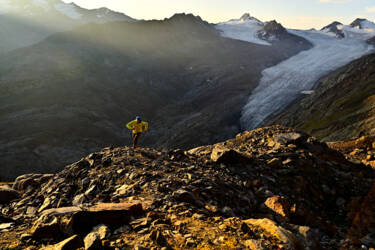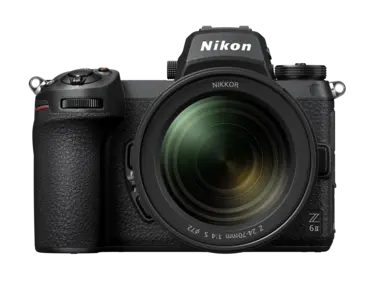Getting started with shooting action adventure

Join Ray Demski as he explores the great outdoors with the tough, lightweight Nikon Z 6II. Ray shares his expertise on planning, lighting, and making the most of magical opportunities
Outdoor photography can mean many things. To me, it’s a chance to reveal a place someone may never have been, in a way that makes them feel like they’re there. I believe that when we live more outside, we feel more connected to the world. I think a good outdoor shot always makes that connection, between people and the world we all share. Whether that world is your neighbourhood park, or the ocean, or the mountains.
When Nikon asked me to take the Z 6II into the Tyrol mountains in Austria to shoot trail runners, I was excited. I’m really happy with how the shoot turned out. Here are a few tips that I found helped me to achieve the outdoor shots I wanted.

What's in my kitbag?

Plan your shoot
How much you plan depends on the kind of shoot you’re going to do — but it’s always good to have an idea of where you’re going and what you’re aiming to shoot. Where will the light strike the landscape at different times of day? What are the weather conditions likely to be?
For this shoot, the planning was pretty simple. There was no lighting involved, just natural light, and in one session, headlamps strapped to the runners’ heads and sometimes a third lamp held by an assistant. I already knew what I wanted to do up there on the mountain, and I knew what kit I needed to take. I had my Nikon Z 6II and a couple of Z system lenses.
Unravel the Nikon Z 6II with Ray Demski
Ray explores Tyrol, Austria

We hiked up the day before, and scouted around, and found this amazing location with a ridge and the glacier behind. It was pretty incredible, and I knew this was where I wanted to do the first shoot.
Weather is an all-important factor when you’re shooting outdoors, especially in the mountains. You have to keep checking the weather, and when you get a good weather window you go for it.
Thanks to the previous day's scouting trip, I’d spent some time imagining where the light would be, so I was able to plan my window for the best light. I knew I wanted to get shots of the runner coming along the ridge with that perfect golden glow you get as twilight transitions to sunlight. That was going to be between 06.30am and 07.30am, so we started up in darkness and were able to shoot at first light.

Make magic with light
I use all kinds of lighting setups on commercial shoots — but when it’s just me and the Nikon Z 6II up in the mountains, it’s all about available light. A really dramatic landscape shot makes you feel involved in these beautiful, inspiring places. It also means you need to use the light to get your subjects to pop from the background, while you’re also highlighting the shape and detail in the scenery and the landscape.
On this shoot I was mostly trying to put the light off to the side of the athletes, and a little behind, which brings out the detail on the runners and the rocks. It really gives you a feel for what it’s like to be in the landscape.

The planning was all about finding a spot where that was possible and then shooting at a time of day when the light is right. I don’t like to shoot at midday, when the light is hard and overhead. Early morning, late afternoon into evening — these are the times when the light is softer and angled, which lets you highlight the details of your subject, or sculpt the surroundings with plenty of texture.
The same technique would work with runners in your local park or hikers in a field. Whatever adventure you choose to shoot, the important thing is to bring the scene alive.

Make the most of your opportunities
Adaptability is vital. Be prepared. Always have your camera ready to go.
I think it can be really great when something unexpected happens. You plan for good weather but then you get these amazing clouds and it looks like it'll rain and for just one moment, the clouds open and you get a little burst of beautiful light.
This actually happened on the second session of my trail running shoot, and it resulted in some lovely images of the athletes running through the stunning landscape with dramatic clouds in the background.

That’s why I love the Nikon Z 6II for shoots like this. It’s fast, and it can keep up with the unexpected. Some of the moments I photograph are absolute once in a lifetime events. I need a mirrorless system I can trust completely and now the Nikon Z 6II has a second card slot, you get another level of security for your files. I usually set up the camera to record images to both slots simultaneously, so I automatically generate a backup copy in camera without having to think about it.


Make focusing easy
When you’re focusing on fast-moving subjects, like trail runners, and you only have a small window of weather and light to work in — you need to be sure you’re focusing sharply first time around.
The Z 6II's eye detection AF works fantastically for closer shots of atheletes. Focus tracking is also great, and auto-area AF works really well. It lets me choose an athlete to track, and I can keep super-sharp focus on that athlete right through the sequence, from distant to pretty close up. The quality of the AF modes means I can rely on them even in extreme, fast-moving situations.


Use tough kit
When the weather gets bad, that’s when you really have to be shooting. I find that the really magical and emotional shots can come in these moments when you don’t really feel like shooting anything. When the storm clouds are rolling in, and it starts to snow, or when the weather transitions and it’s super windy — that’s when you should have your camera ready.

The Nikon Z 6II is a really great camera for those tough environments. It's weather sealing means I don’t have to baby it, as I really don't want to worry about my gear when I’m out there. I don’t want to think about trying to keep the camera dry when I’m hanging off the side of a cliff on a rope.
My standard setup, which I still use a lot, is a Nikon D850 and a couple of lenses, or a D6 if I want to shoot with higher frame rates. Neither of those setups are particularly light! When you’re talking about the D6, you’re talking about a camera body on its own that weighs as much as a Nikon Z 6II plus lenses and batteries. When I’m shooting outdoors, on an adventure shoot or on my own, it’s pretty cool to have a small, light camera that I can rely on — like the Nikon Z 6II.
Even though the Nikon Z 6II is small, there’s no compromise in image quality at all. Especially with the new Z lenses, the Nikon Z 6II puts out countless keepers.

One lens to rule them all?
I love my primes, but a prime doesn’t have the range you need for action in an outdoor setting. That’s particularly true when my movement is restricted by the environment, for example when I’m hanging off a cliff face. So I need to take a zoom. I probably use a NIKKOR Z 24-70mm f/2.8 S more than any other lens. It provides such a versatile range, which is exactly what you need if you’re shooting from a precarious position with just one chance to get the image. On some outdoor sessions, it’s the only lens on my camera.


On this shoot, I also used a NIKKOR Z 70-200mm f/2.8 VR S, which I used with auto-area AF focus tracking with great success. I think the image quality is some of the best I've gotten from a 70-200mm zoom. I also really love the NIKKOR Z 14-24mm f/2.8 S, it's light and the quality is really great too.
What does your great outdoors look like? Find a spot you love, and use Ray’s tips to plan and execute a shoot that really captures what it’s like to be there.

Featured Products
Run wild

Iskoračite iz zone komfora





